Jonathan Rowson
Chess for Zebras
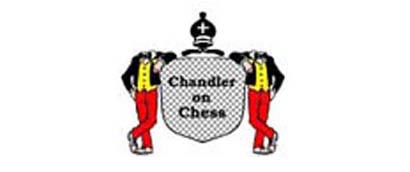
‘I’m enjoying it – but I don’t like it.’ Geoff Chandler, October 2005
‘Not another chess book!’ howls Mrs Chandler, ‘Anymore and we will have to move house.’
She is of course exaggerating. I have 71 chess books; she, on the other hand, has over 100 books on horses. Do you hear me complaining when I have to place my books on a makeshift and very unstable shelf? (It’s actually a plank of wood laid across twelve unwanted videos, six on each side). The three large book cabinets we do own have been commandeered by the likes of Harvey Smith, David Broome and Peter O’Sullivan. Not to mention Dick Francis. We (she) have every Dick Francis book in both soft and hardback.
Why in both formats? Why indeed.
We were married in 1977 and after 28 years I have still to figure out the hows, the ifs and the whys.
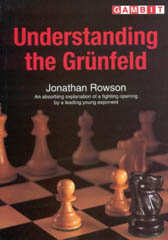 Ah yes, 1977. A good year for marriages, I’m thinking. But also a good year for chess players to be born. Jonathan Rowson popped into existence on the 18th April 1977. He studied Philosophy, Politics, and Economics at Oxford University. He won the British Chess Championship back to back in 2004 and 2005 and this is his third chess book. The other two are Understanding the Grunfeld, an opening book which I have not read, and Seven Deadly Chess Sins.
Ah yes, 1977. A good year for marriages, I’m thinking. But also a good year for chess players to be born. Jonathan Rowson popped into existence on the 18th April 1977. He studied Philosophy, Politics, and Economics at Oxford University. He won the British Chess Championship back to back in 2004 and 2005 and this is his third chess book. The other two are Understanding the Grunfeld, an opening book which I have not read, and Seven Deadly Chess Sins.
Seven Deadly Chess Sins (7DCS) I have read, and gosh what a monster of a book. I was baffled, confused and disappointed. I felt inadequate, dumb and isolated.
Yes, that’s the word. Isolated.
I was reading reviews stating that 7DCS was wonderful, ground-breaking, etc. etc. Yet it went straight over my head. Of course I knew what he was saying; here are seven reasons why you lose games – don’t make these mistakes again. But the manner and the way it was expressed? To me it was pages and pages of gibberish.
An example:
Indeed, one of the most significant aspects E=mc2 is that it says we need a massive amount of energy to create a little bit of mass … This may be pushing it too far, but if I’m right to think that the c2 in chess is best viewed as one (so that material and energy can be viewed as exactly equal) then it reflects the time (initiative) aspect of the game too because the relationship of mass and energy in a given position will depend on one side’s use of the material on the available move, and the prospective response. [Page 133]
I think this means the result of a game of chess depends on whose move it is, what that move is and what the response to that move is. Is it?
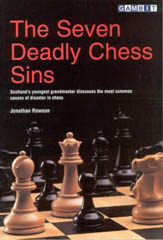 I later swapped 7DCS for a book on quick wins recorded in correspondence play by T. D. Harding. A good book; I had found my level. Yet I still had this isolated feeling. How come everyone got the gist of 7DCS except me? At what stop did I get off the bus? Was I ever on the bus? Then I discovered Taylor Kingston’s review at ChessCafe.com. This was a scathing review. I actually felt sorry for Jonathan, but it made me feel better.
I later swapped 7DCS for a book on quick wins recorded in correspondence play by T. D. Harding. A good book; I had found my level. Yet I still had this isolated feeling. How come everyone got the gist of 7DCS except me? At what stop did I get off the bus? Was I ever on the bus? Then I discovered Taylor Kingston’s review at ChessCafe.com. This was a scathing review. I actually felt sorry for Jonathan, but it made me feel better.
‘The Seven Deadly Chess Sins is strong evidence that to the seven we should add two more: writing this book, and buying it.’ Taylor Kingston
So why am I having a pop at 7DCS? I’m meant to be reviewing Chess for Zebras. There are two reasons. First, I do not want the reader to think I’m one of the clichéd ‘Ooh, a Grandmaster, this must be a good book’ brigade. Honestly, some chess reviewers would have given Mein Kampf five stars if Hitler had been a Grandmaster. Second, and more important, I do not want people to judge Chess for Zebras based on 7DCS. When I told some players at the October 2005 Scottish National League tournament that I had a copy of Chess for Zebras, I was met with groans. The two times Scottish British Champion writes a chess book, and people roll their eyes and groan.
Forget The Seven Deadly Chess Sins do not condemn Chess for Zebras just because 7DCS failed.
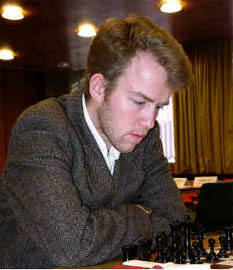
Left: Jonathan Rowson
Chess for Zebras is one of the most honest and frank chess books I have ever had the pleasure to read. And I can do no more than return an honest and frank review. This will stand out as a classic. It really is a good chess book.
In chess you can learn from your mistakes. A young author has learned from his mistake. I think, and this is total conjecture, he knows 7DCS was a bit too high brow. Hopefully he has a few friends who were honest enough to say 7DCS was alright but that it really did go over most people’s heads. On page 238 of Chess for Zebras, he writes:
The next few paragraphs are necessarily abstract and they won’t be to everyone’s taste, so please bear with me, or skip to the annotated games.
Despite the warning, I read the paragraphs in question. They were OK. Jonathan has taken some advice on board for his new book. He is saying: ‘OK, you want it in plain simple terms. I’ll give it to you in plain and simple terms.’
Oh yes, the scary 7DCS words are still there. ‘Psycho-Logics’, ‘The Intelligent Unconscious’, ‘Fabulation’, but this time the bulk of the text has been watered down into layman’s language. And how. At the start of this piece I stated: ‘I’m enjoying it – but I don’t like it.’ Jonathan lists common faults in players and I score highly on each one. I know what’s wrong with my game but seeing it in print was a healthy kick in the teeth. Having identified myself from his examples (a thwarted genius), I’m told I know nothing about chess, and with every sentence this fact is being proved to me.
He lists the excuses chess Players use for losing games. I’m there again. ‘At least I learn something from a loss.’
And Jonathan is right, this is a comfort zone, I lose because I have a nice little saying that will make it all OK. All I have learnt from my losses is how to lose. Jonathan is not saying you never learn anything from a defeat – just don’t let these lessons become a habit. A crutch.
Having recovered from this, I’m informed that if I play an opening I know is dodgy, then I have a character defect. A character defect? Sometimes, as Black, I play an opening called the Latvian Gambit. I know it’s dodgy. So why do I play it? To upset my opponent, in the hope that he does not know any of the many good lines against it. Now read again what I have just written. Can you believe that? and hope he does not know any of the many good lines against it. This is high class chess. Not. It is a character defect.
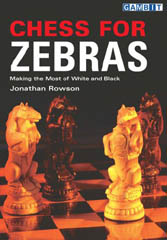 Chess for Zebras is writing of the highest quality. Jonathan has the ability to identify his reader, grab him by the neck, pull him into the book and slap him around a bit until he has got the point. The book is full of instructive tips and, for want of a better word, essays. Each essay has a mouth watering and thought provoking title. ‘Planning in Pencil and Playing in Pen’, ‘Learning and Unlearning’, ‘The Importance of Not Having a Clue’, ‘What’s so special about the Sicilian?’, ‘Gumption Revisited’. Usually each essay has a relevant game attached, complete with Jonathan’s excellent notes. (That was the one saving grace of 7DCS. Jonathan knows how to annotate a game of chess – most top chess players do not).
Chess for Zebras is writing of the highest quality. Jonathan has the ability to identify his reader, grab him by the neck, pull him into the book and slap him around a bit until he has got the point. The book is full of instructive tips and, for want of a better word, essays. Each essay has a mouth watering and thought provoking title. ‘Planning in Pencil and Playing in Pen’, ‘Learning and Unlearning’, ‘The Importance of Not Having a Clue’, ‘What’s so special about the Sicilian?’, ‘Gumption Revisited’. Usually each essay has a relevant game attached, complete with Jonathan’s excellent notes. (That was the one saving grace of 7DCS. Jonathan knows how to annotate a game of chess – most top chess players do not).
The essays are grouped together in three parts. First, ‘Improving Our Capacity to Improve’. Adults have tremendous difficulty improving at chess because they come to the board with so much baggage and have ‘deep-seated fears, desires, prejudices and habits.’ In the introduction we are told that Part I is a mini sequel to 7DCS. On reading this, my heart fell into my boots. But it is OK. Part I is nothing like 7DCS. Part I is beneficial and reads very well.
Second, ‘A Mental Toolkit for the Exponential Jungle’. The message is, it’s not all about you. Sometimes you just have to play decent moves and your opponent will do your work for you.
Finally, ‘Thinking Colourfully about Black and White’. White’s ‘extra move’ can be a burden, and sometimes White finds himself in a mild form of zugzwang (‘Zugzwang Lite’). Zugzwang is a German word used in chess to describe a position you don’t want to find yourself in. Basically, your position is OK at the moment, but it is your move and any move you make will cost you the game.
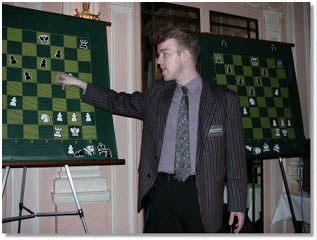
Jonathan points fingers, he stamps his foot and he shakes his head. I have never seen anything like this is a chess book before.
On page 246 he unfolds:
This game is precious to me … If and when my life flashes before my eyes, I suspect this game will be part of that flash.
Jonathan feels tragically sorry for the unnamed player he was coaching who just wanted to study openings. ‘The Champion of America just studies openings’, said the weaker player.
Andras Adorjan is a Hungarian Grandmaster who makes his living writing chess books championing the cause of the black pieces. Black is OK is his most famous work. I quite like it.
‘In many opening books, where an assessment is given as equal, if you look closely you find that Black is already better.’ Andras Adorjan
Jonathan has a go at pulling Adorjan’s Black is OK theories to pieces, at the same time acknowledging Adorjan’s contribution to opening theory. Adorjan’s claims do not stand up to the clever scrutiny of his cross-examination. But I don’t think we have heard the last of this matter. Adorjan is bound to reply.
(I played Adorjan once. I was Black, I lost – Black was not OK that night)
He agrees with Nigel Davies that it does not matter which aspect of the game you study as long as you do the thinking rather than the bland memorising.
The reality is that you’ve got to move the pieces around the board and play with the position. Who does that? Amateurs don’t, GMs do.
For years I’ve been telling my students, or anybody who will listen, that whenever you play f4 of f5 from a Kingside castled position it is always a ‘big’ move. ‘It will either be good or bad. Give it extra thought.’ ‘Why Geoff?’ ‘Because you will get caught out with a check on the a7-g1/a2-g8 diagonal.’ Jonathan touches on this subject as well. OK, it’s a well known theme, but the idea of the ‘box’ never occurred to me, nor how f4 weakens g4, which may force h3, thus weakening g3. There follows an instructive game featuring f4. And Jonathan got the idea from a 1300 player! He uses the simple term ‘trigger happy with the f-pawn.’
‘Trigger happy with the f-pawn.’ OK, you have just read it, I bet you will never forget it. Next time you play and the f-pawn jumps into your mind you will think twice. See, already you are a better player and you have only read the review! These little memory-sticking phrases are dotted all over the book.
He has stepped down from the lofty tower he built himself in 7DCS. He can write, he can explain things in a clear and instructive manner. That is all we ask. What’s more, he’s enjoying what he’s doing, and this comes across to the reader. These gems of knowledge that have fallen onto the pages have most likely been put down without a moment’s thought. The simple way, straight from the heart.
I like his comments on the guys who cut and paste their computer’s analysis on bulletin boards, passing it off as thought. ‘Gazza will win! Shredder says it’s 0.67.’
OK, I’m not going to quote all the good bits from this book. There are far too many. Football, Tennis, Drunken Irishmen, Jaffa cakes (yes, Jaffa cakes), air guitar (I cannot wait to see everybody playing an air guitar prior to their games), driving (keep within the hedge); they all get a mention as Jonathan breaks up his text with humorous anecdotes and metaphors.
Gripes? Two very minor points. And this really is nit picking. Jonathan states he learnt a lot from some positions shown to him when he was staying with Artur Yusopov: ‘my ego has never had such a systematic pounding.’ I would like to have seen some of those positions, but they are not presented in the book. And in the section called ‘Developing Skill’ he advises you ‘try to win won positions against strong analysis engines.’ Again I would have liked a few positions just to get me started and to give me an idea of what type of position I should play against. OK, I’m not stupid, I can select positions on my own, but what Jonathan would select for a winning position will vastly differ to my selection. Taking it to the extreme, he would possibly choose: level material, slight weakness in the opposing pawn structure (that is all he needs to win). I would choose: a piece up and a naked king (that is what I require to win). This is not so much a gripe as a plea for help!
If you are a chess player then you will need this book. Players will be quoting from it for years to come and if you do not own it then you will be left out in the cold, clutching some worthless opening book and watching your grade slide.
I’ve learned the chords to ‘Hole in My Bucket’, and next time I’m at a tournament and Jonathan is there, perhaps we will get on stage in between the prize givings and sing it. (It will be the only way I get on the stage during prize giving).
I’ll be Henry.
What on earth am I talking about now? You will have to buy the book. Buy the book, Read the book. Study the book. Don’t lend it out, you will never get it back.
’990f chess books should never been written.’ A famous GM said that.
‘Chess for Zebras, welcome to the 1%.’ I said that.
I’m glad I don’t earn my living writing chess books. Who is going to follow this?
© Geoff Chandler 2005
Chess For Zebras: Making the most of black and white (ISBN 1901983854 PBK £17.99), Understanding the Grunfeld: An absorbing explanation of a fighting opening by a leading young exponent (ISBN 1901983099 PBK £15.99) and The Seven Deadly Chess Sins (ISBN 1901983366 PBK £16.99), all by Jonathan Rowson, are available from Gambit Publications.

Comments